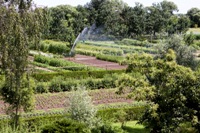Environmental impact
Homeopathic and anthroposophic medicinal products have negligible environmental impact, making this ‘one of the most eco-friendly and sustainable forms of healthcare on the planet’. [1] The majority of homeopathic substances have no environmental toxicity.
In addition, the sector for homeopathic and anthroposophic medicinal products fosters environmental protection and biodiversity. Most ECHAMP members take measures to promote organic farming for their source materials, fostering biodynamic agriculture and biodiversity through organic cultivation of plants. Many have their own medicinal gardens or work with appropriately certified suppliers, optimising the use of natural resources throughout their supply chain.
Biodynamics, the anthroposophic approach to agriculture, has long encouraged an organic approach involving reduction in unnecessary inputs or use of antibiotics. The practice of Biodynamic agriculture is shown to preserve nature, increase soil fertility, and enhance biodiversity. Anthroposophic medicine manufacturers are pioneers in cultivating their gardens in accordance with Demeter biodynamic agriculture practices, complying with EU standards for organic farming. [2]
[1] K. Chatfield, Simile, Faculty of Homeopathy, November 2016
[2] Organic farming enhances soil fertility and biodiversity, FIBL, 2000

